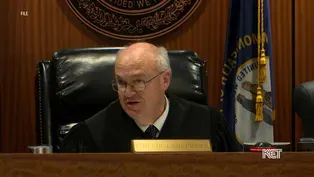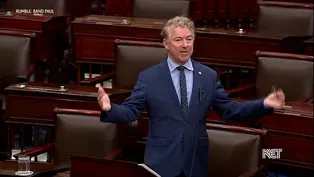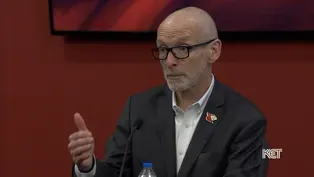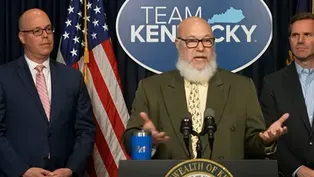
UK Researchers Discuss Impact of NIH Funding Cuts
Clip: Season 3 Episode 221 | 3m 47sVideo has Closed Captions
The university is trying to determine the full impact of the Trump administration's order.
The University of Kentucky is trying to determine the full impact of a Trump administration order to cut grants provided by the National Institutes of Health and other federal agencies. Researchers at U.K. say it will disrupt critical research into health issues affecting Kentuckians.
Problems with Closed Captions? Closed Captioning Feedback
Problems with Closed Captions? Closed Captioning Feedback
Kentucky Edition is a local public television program presented by KET

UK Researchers Discuss Impact of NIH Funding Cuts
Clip: Season 3 Episode 221 | 3m 47sVideo has Closed Captions
The University of Kentucky is trying to determine the full impact of a Trump administration order to cut grants provided by the National Institutes of Health and other federal agencies. Researchers at U.K. say it will disrupt critical research into health issues affecting Kentuckians.
Problems with Closed Captions? Closed Captioning Feedback
How to Watch Kentucky Edition
Kentucky Edition is available to stream on pbs.org and the free PBS App, available on iPhone, Apple TV, Android TV, Android smartphones, Amazon Fire TV, Amazon Fire Tablet, Roku, Samsung Smart TV, and Vizio.
Providing Support for PBS.org
Learn Moreabout PBS online sponsorshipThe University of Kentucky is also trying to determine the full impact of a Trump administration order to cut grants provided by the National Institutes of Health and other federal agencies.
According to UK President Eli Capelouto, the cuts will mean the loss of tens of millions of dollars for the university at an annual conference for UK researchers.
Those we spoke with say it will disrupt critical research into health issues affecting Kentuckians, including cancer, heart disease and substance use disorder.
Arts center intends to bring people together to study and to promote translational science.
What is translational science?
It's moving the needle from, you know, from the test tube to animals to humans and then to communities of humans, and eventually to actually practice, to actually get treatments, new treatments to people and where they live into their communities of moving people, moving discoveries, you know, from bench to bedside, as they say.
And it is the only conference on campus that brings together all of our researchers.
You know, the key aspect is that it's translational research.
So you have people, again, working from very basic science to clinical trials and out in the community all coming together and people studying all types of different diseases.
Right.
Again, I said diabetes, cancer, addiction.
This is the one time of year that we all get together in one space and share our work with each other.
So my research is to understand basic mechanisms of substance use disorders, as well as to identify and advance treatments for substance use disorders.
We face some major issues around addiction, and is happens to be a strong suit of research here at UK.
My research, is all clinical trial research.
We do both human laboratory work to understand basic mechanisms, but we also do clinical trials to actually test the effectiveness and efficacy of treatments.
It's one thing to discover something in a mouse, and that might be very important.
But ultimately, you know, we want to get treatments to people, to people who really need it.
And sometimes the people who need it the most, of the people that are the most remote and most and most are hard to reach, either because they live in a rural area or they're they're distrustful of the medical profession or in some ways doomed, don't have good access.
So that's a very important part of research to actually get it to people who need it the most.
So NIH very generously funds a lot of research at the University of Kentucky.
This, this runs the spectrum from very basic science, preclinical research with animals and medications development all the way out into the community, trying to understand how treatments work, how the communities might like the treatments, whether they, you know, they're effective, those kind of things.
This supports jobs.
It helps us, support basic infrastructure equipment to do our work.
Regulatory aspects of our research.
So NIH funding is crucial to making all of that go.
We're always worried about NIH funding, and we're always thinking about it to, you know, to help us do our research, but also to, you know, to improve the health of Americans.
My work is addiction focused, but we've got, cancer researchers.
We've got Alzheimer's researchers.
We've got people who are doing work on, stroke, diabetes, all NIH funded.
Really, really vital to both the mission of the university as well as improving the health of, the citizens in the Commonwealth when funding is, is not available overall for the field.
Right.
And, that means that perhaps treatments will not be identified or delivered or advanced.
We might be missing out on some basic discovery that really in 4 or 5, ten years could revolutionize the the cures we can bring to our patients, both at UK and throughout the country.
Beshear Sues to Stop Implementation of New Law
Video has Closed Captions
Beshear's lawsuit calls House Bill 6 the "latest power grab" by the General Assembly. (49s)
McConnell, Paul Criticize Trump's Tariffs
Video has Closed Captions
Both Republican senators joined Democrats in voting against the tariff on Canada. (3m 27s)
New UofL President Talks DEI, NIH Funding Cuts
Video has Closed Captions
Gerry Bradley says university presidents still need clarity on HB 4. (2m)
Sec. Eric Friedlander Retiring
Video has Closed Captions
Gov. Beshear said Friedlander will retire August 1. (2m 9s)
Tornadoes, Severe Storms Cause Damage Across Kentucky
Video has Closed Captions
The overnight storm is the first round of severe weather headed our way. (4m 31s)
Providing Support for PBS.org
Learn Moreabout PBS online sponsorshipKentucky Edition is a local public television program presented by KET
















